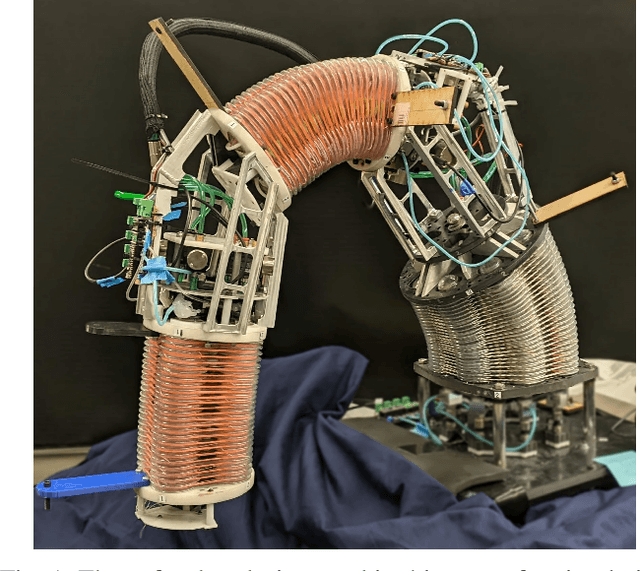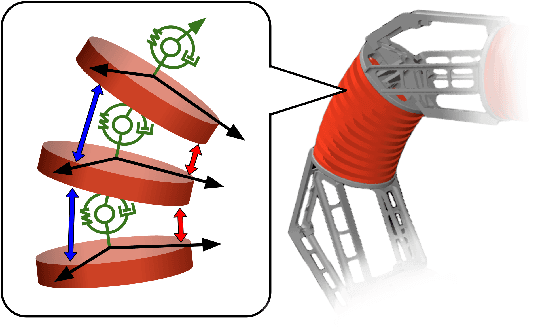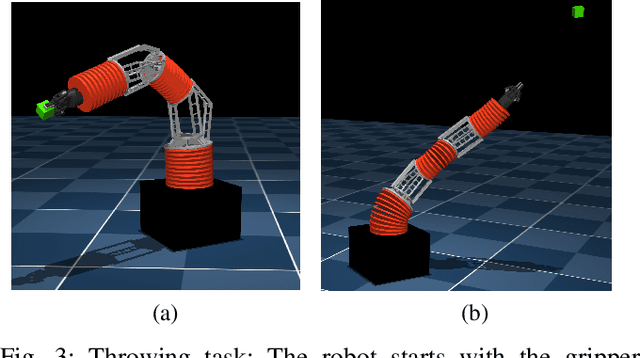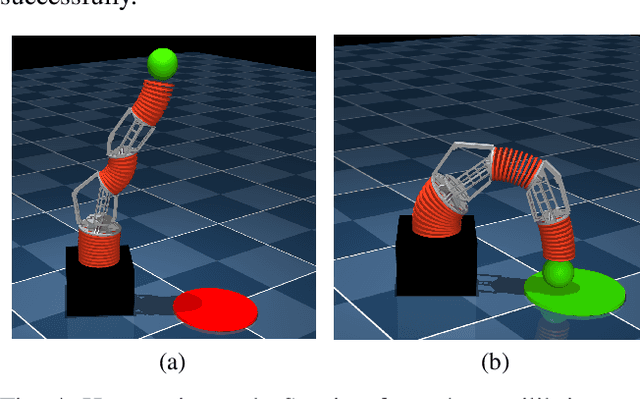Curtis C. Johnson
Scaling Fabric-Based Piezoresistive Sensor Arrays for Whole-Body Tactile Sensing
Aug 28, 2025Abstract:Scaling tactile sensing for robust whole-body manipulation is a significant challenge, often limited by wiring complexity, data throughput, and system reliability. This paper presents a complete architecture designed to overcome these barriers. Our approach pairs open-source, fabric-based sensors with custom readout electronics that reduce signal crosstalk to less than 3.3% through hardware-based mitigation. Critically, we introduce a novel, daisy-chained SPI bus topology that avoids the practical limitations of common wireless protocols and the prohibitive wiring complexity of USB hub-based systems. This architecture streams synchronized data from over 8,000 taxels across 1 square meter of sensing area at update rates exceeding 50 FPS, confirming its suitability for real-time control. We validate the system's efficacy in a whole-body grasping task where, without feedback, the robot's open-loop trajectory results in an uncontrolled application of force that slowly crushes a deformable cardboard box. With real-time tactile feedback, the robot transforms this motion into a gentle, stable grasp, successfully manipulating the object without causing structural damage. This work provides a robust and well-characterized platform to enable future research in advanced whole-body control and physical human-robot interaction.
PneuDrive: An Embedded Pressure Control System and Modeling Toolkit for Large-Scale Soft Robots
Mar 31, 2025Abstract:In this paper, we present a modular pressure control system called PneuDrive that can be used for large-scale, pneumatically-actuated soft robots. The design is particularly suited for situations which require distributed pressure control and high flow rates. Up to four embedded pressure control modules can be daisy-chained together as peripherals on a robust RS-485 bus, enabling closed-loop control of up to 16 valves with pressures ranging from 0-100 psig (0-689 kPa) over distances of more than 10 meters. The system is configured as a C++ ROS node by default. However, independent of ROS, we provide a Python interface with a scripting API for added flexibility. We demonstrate our implementation of PneuDrive through various trajectory tracking experiments for a three-joint, continuum soft robot with 12 different pressure inputs. Finally, we present a modeling toolkit with implementations of three dynamic actuation models, all suitable for real-time simulation and control. We demonstrate the use of this toolkit in customizing each model with real-world data and evaluating the performance of each model. The results serve as a reference guide for choosing between several actuation models in a principled manner. A video summarizing our results can be found here: https://bit.ly/3QkrEqO.
* Proceedings of the 2024 IEEE 7th International Conference on Soft Robotics (RoboSoft)
Learning Dynamic Tasks on a Large-scale Soft Robot in a Handful of Trials
Nov 13, 2024



Abstract:Soft robots offer more flexibility, compliance, and adaptability than traditional rigid robots. They are also typically lighter and cheaper to manufacture. However, their use in real-world applications is limited due to modeling challenges and difficulties in integrating effective proprioceptive sensors. Large-scale soft robots ($\approx$ two meters in length) have greater modeling complexity due to increased inertia and related effects of gravity. Common efforts to ease these modeling difficulties such as assuming simple kinematic and dynamics models also limit the general capabilities of soft robots and are not applicable in tasks requiring fast, dynamic motion like throwing and hammering. To overcome these challenges, we propose a data-efficient Bayesian optimization-based approach for learning control policies for dynamic tasks on a large-scale soft robot. Our approach optimizes the task objective function directly from commanded pressures, without requiring approximate kinematics or dynamics as an intermediate step. We demonstrate the effectiveness of our approach through both simulated and real-world experiments.
Baloo: A Large-Scale Hybrid Soft Robotic Torso for Whole-Arm Manipulation
Sep 12, 2024



Abstract:Soft robotic actuators and their inherent compliance can simplify the design of controllers when operating in contact-rich environments. With such structures we can accomplish high-impact, dynamic, and contact-rich tasks that would be difficult using conventional rigid robots which might either break the robot or the object without careful modeling and design of high bandwidth controllers. In order to explore the benefits of structural passive compliance and exploit them effectively, we present a prototype robotic torso named Baloo, designed with a hybrid rigid-soft methodology, incorporating both adaptability from soft components and strength from rigid components. Baloo consists of two meter-long, pneumatically-driven soft robot arms mounted on a rigid torso and driven vertically by a linear actuator. We explore some challenges inherent in controlling this type of robot and build on previous work with rigid robots to develop a joint-level neural-network adaptive controller to enable high performance tracking of highly nonlinear, time-varying soft robot dynamics. We also demonstrate a promising use case for the platform with several hardware experiments performing whole-body manipulation with large, heavy, and unwieldy objects. A video of our results can be viewed at https://youtu.be/eTUvBEVGKXY.
 Add to Chrome
Add to Chrome Add to Firefox
Add to Firefox Add to Edge
Add to Edge